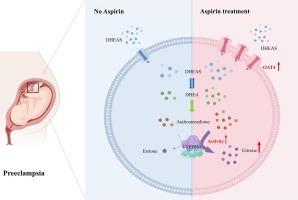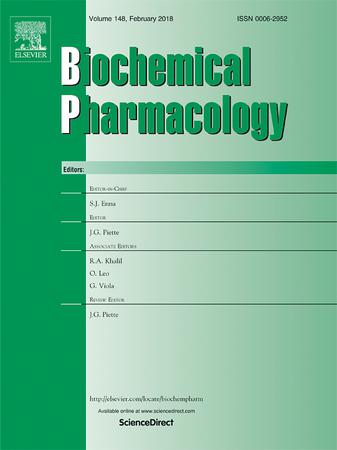阿司匹林可增加胎盘中的雌激素水平,通过调节胎盘代谢和运输功能来预防子痫前期。
IF 5.3
2区 医学
Q1 PHARMACOLOGY & PHARMACY
引用次数: 0
摘要
子痫前期是妊娠期一种特殊的多系统进行性疾病,严重危害孕妇和胎儿的健康。在临床实践中,阿司匹林被推荐用于预防子痫前期,但阿司匹林预防子痫前期的机制尚未揭示。本报告全面评估了阿司匹林对胎盘代谢酶和转运体的表达和活性的影响。我们发现,服用阿司匹林后,只有有机阴离子转运体 4(OAT4)在胎盘中的表达在 mRNA 和蛋白水平上有显著增加,这与在 JAR 细胞中的结果一致。同时,对胎盘中代谢酶活性的研究表明,CYP19A1 的活性有较高的上调。随后,在胎盘组织中检测到 OAT4 和 CYP19A1 的内源性底物(硫酸脱氢表雄酮(DHEAS)和雄烯二酮)以及雌酮明显增加。总之,阿司匹林可通过 OAT4 增强 DHEAS 的运输,并通过 CYP19A1 促进雄烯二酮的代谢,从而增加胎盘中的雌激素水平。这可能是阿司匹林通过调节胎盘的代谢和转运功能来预防子痫前期和维持妊娠的机制。本文章由计算机程序翻译,如有差异,请以英文原文为准。

Aspirin increases estrogen levels in the placenta to prevent preeclampsia by regulating placental metabolism and transport function
Preeclampsia is a unique multisystem progressive disease during pregnancy, which seriously endangers the health of pregnant women and fetuses. In clinical practice, aspirin is recommended for the prevention of preeclampsia, but the mechanism by which aspirin prevents preeclampsia has not yet been revealed. This report comprehensively evaluates the effects of aspirin on the expression and activity of placental metabolic enzymes and transporters. We found that after aspirin administration, only the expression of organic anion transporter 4 (OAT4) in the placenta showed a significant increase at both mRNA and protein levels, consistent with the results in JAR cells. Meanwhile, studies on the metabolic enzyme activity in the placenta showed a high upregulation of CYP19A1 activity. Subsequently, significant increases in endogenous substrates of OAT4 and CYP19A1 (dehydroepiandrosterone sulfate (DHEAS) and androstenedione) as well as estrone were detected in placental tissue. In summary, aspirin enhances the transport of DHEAS through OAT4 and promotes the metabolism of androstenedione through CYP19A1, thereby increasing estrogen levels in the placenta. This may be the mechanism by which aspirin prevents preeclampsia and maintains pregnancy by regulating the metabolism and transport function of the placenta.
求助全文
通过发布文献求助,成功后即可免费获取论文全文。
去求助
来源期刊

Biochemical pharmacology
医学-药学
CiteScore
10.30
自引率
1.70%
发文量
420
审稿时长
17 days
期刊介绍:
Biochemical Pharmacology publishes original research findings, Commentaries and review articles related to the elucidation of cellular and tissue function(s) at the biochemical and molecular levels, the modification of cellular phenotype(s) by genetic, transcriptional/translational or drug/compound-induced modifications, as well as the pharmacodynamics and pharmacokinetics of xenobiotics and drugs, the latter including both small molecules and biologics.
The journal''s target audience includes scientists engaged in the identification and study of the mechanisms of action of xenobiotics, biologics and drugs and in the drug discovery and development process.
All areas of cellular biology and cellular, tissue/organ and whole animal pharmacology fall within the scope of the journal. Drug classes covered include anti-infectives, anti-inflammatory agents, chemotherapeutics, cardiovascular, endocrinological, immunological, metabolic, neurological and psychiatric drugs, as well as research on drug metabolism and kinetics. While medicinal chemistry is a topic of complimentary interest, manuscripts in this area must contain sufficient biological data to characterize pharmacologically the compounds reported. Submissions describing work focused predominately on chemical synthesis and molecular modeling will not be considered for review.
While particular emphasis is placed on reporting the results of molecular and biochemical studies, research involving the use of tissue and animal models of human pathophysiology and toxicology is of interest to the extent that it helps define drug mechanisms of action, safety and efficacy.
 求助内容:
求助内容: 应助结果提醒方式:
应助结果提醒方式:


